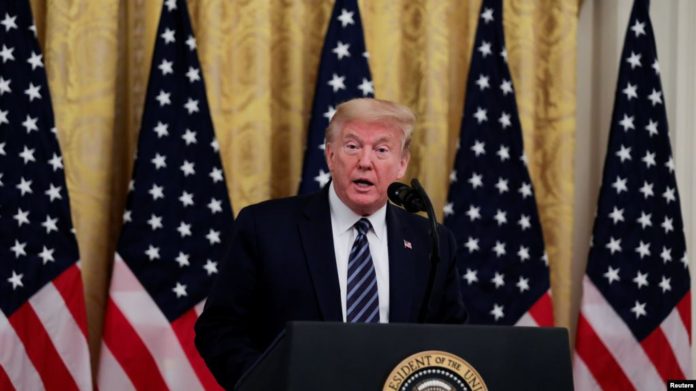For the first time, U.S. President Donald Trump is suggesting delaying this year’s election.
Trump, on Twitter on Thursday morning, alleged, without evidence, that mail-in balloting would be make the 2020 presidential balloting the “most INACCURATE & FRAUDULENT Election in history.”
The president added: “It will be a great embarrassment to the USA. Delay the Election until people can properly, securely and safely vote???
The president does not have the power to delay the election, (the Tuesday after the first Monday in November in every fourth year), which is to be held November 3rd, 2020. The date is set by Congress under the Constitution.
During a hearing on Capitol Hill, Secretary of State Mike Pompeo was asked by Sen. Tim Kaine of Virginia about Trump’s tweet.
Pompeo, who is fourth in the line of succession to the presidency, said that he did not want to make a legal judgment on the fly about whether it is possible to delay the election, but “in the end, the Department of Justice and others will make that legal determination.”
Top Republicans quickly rebuff suggestion
“There will be no delay” for this year’s presidential election, tweeted Congressman Rodney Davis of Illinois.
“Congress sets the election date, and it should not be changed. It will be held on November 3rd, as planned and required by law,” added Davis, who is the ranking Republican on the House Administration Committee, which has jurisdiction over the presidential election.
The Republican House Minority leader Kevin McCarthy said the election should go forward despite any concerns by Trump.
“I understand the president’s concern about mail-in voting which is different from absentee voting. But never in the history of the Federal elections have we not held an election and we should go forward,” McCarthy told reporters Thursday.
Bipartisan condemnation
Trump’s tweet quickly prompted bipartisan condemnation.
This is not an idea anyone, especially the president, should float, said Ari Fleischer, who was a White House press secretary in the administration of President George W. Bush, a Republican.
“I would quickly delete this tweet,” if he were president, Fleischer said.
Democratic Sen. Tom Udall of New Mexico said the fact that the president “is even suggesting it is a serious, chilling attack on the democratic process. All members of Congress — and the administration— should speak out.”
Election officials, civil rights groups and historians also are criticizing the president’s suggestion.
“No, Mr. President. No. You don’t have the power to move the election. Nor should it be moved,” tweeted Federal Election Commissioner Ellen Weintraub, a Democratic appointee. “States and localities are asking you and Congress for funds so they can properly run the safe and secure elections all Americans want. Why don’t you work on that?”
President Donald Trump looks at his phone during a roundtable with governors on the reopening of America’s small businesses, in…
FILE – President Donald Trump checks his phone during a meeting in the State Dining Room of the White House, in Washington, June 18, 2020.
For the first time, U.S. President Donald Trump is suggesting delaying this year’s election.
Trump, on Twitter on Thursday morning, alleged, without evidence, that mail-in balloting would be make the 2020 presidential balloting the “most INACCURATE & FRAUDULENT Election in history.”
The president added: “It will be a great embarrassment to the USA. Delay the Election until people can properly, securely and safely vote???
The president does not have the power to delay the election, (the Tuesday after the first Monday in November in every fourth year), which is to be held November 3rd, 2020. The date is set by Congress under the Constitution.
During a hearing on Capitol Hill, Secretary of State Mike Pompeo was asked by Sen. Tim Kaine of Virginia about Trump’s tweet.
Pompeo, who is fourth in the line of succession to the presidency, said that he did not want to make a legal judgment on the fly about whether it is possible to delay the election, but “in the end, the Department of Justice and others will make that legal determination.”
Who can vote by mail in the US
Top Republicans quickly rebuff suggestion
“There will be no delay” for this year’s presidential election, tweeted Congressman Rodney Davis of Illinois.
“Congress sets the election date, and it should not be changed. It will be held on November 3rd, as planned and required by law,” added Davis, who is the ranking Republican on the House Administration Committee, which has jurisdiction over the presidential election.
The Republican House Minority leader Kevin McCarthy said the election should go forward despite any concerns by Trump.
“I understand the president’s concern about mail-in voting which is different from absentee voting. But never in the history of the Federal elections have we not held an election and we should go forward,” McCarthy told reporters Thursday.
Bipartisan condemnation
Trump’s tweet quickly prompted bipartisan condemnation.
This is not an idea anyone, especially the president, should float, said Ari Fleischer, who was a White House press secretary in the administration of President George W. Bush, a Republican.
“I would quickly delete this tweet,” if he were president, Fleischer said.
Democratic Sen. Tom Udall of New Mexico said the fact that the president “is even suggesting it is a serious, chilling attack on the democratic process. All members of Congress — and the administration— should speak out.”
“This is America. We are a democracy, not a dictatorship,” said Dale Ho, director of the voting rights project of the American Civil Liberties Union. “The Constitution sets the date for the election in November. Nothing President Trump says, does, or tweets can change that fact.”
Delaying the election would violate American law, wrote presidential historian Michael Beschloss on Twitter.
“Never in American history—not even during the Civil War and World War II–has there been a successful move to ‘Delay the Election’ for President,” said Beschloss, the author of ten books about American history.



























